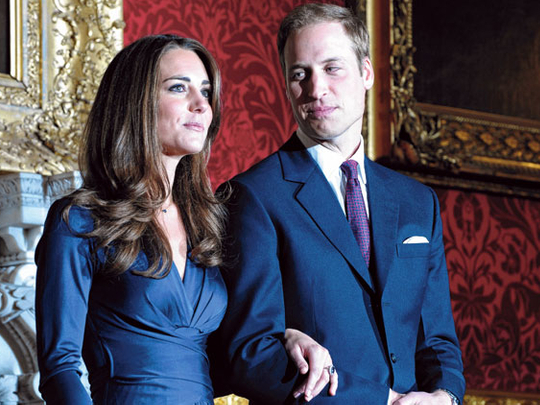
Did you know that there was no royal wedding in Westminster Abbey between 1382 and 1919? (In the intervening period, the couples were married more privately — in the Chapel Royal, for example.) Since then, there have been nine.
This fact tells you something surprising: in modern times, royal weddings have become more important in British national life than ever before. There's a school of thought that says that the service doesn't matter. I recently read a public figure quoted as saying: "I'm not really a massive fan of the bit in the church. The thought of watching somebody else's wedding, well, it isn't for me."
Fortunately for the British monarchy, this view is a minority one. It is said that two billion people will watch Prince William marry Kate Middleton on Friday.
There have been various stories about attention-seeking republicans trying to spoil the ceremony. A few newspapers have run anti-wedding supplements and features. They are all so dismally counterproductive that one might ask why they bother.
I think I know why. If I were a republican, this wedding would worry me. I could not just shrug it off as a brief diversion. I would see it — and I would be right to see it — as a major challenge to my dreams of change.
In the first place, there is the sheer popularity. The preacher at the wedding will be Richard Chartres, the Bishop of London. He knows the royal family better than any other clergyman, dating back to his time at university with the Prince of Wales. Last month, he confirmed Miss Middleton.
In 1981, when Prince Charles married Lady Diana Spencer, the young Chartres was chaplain to the Archbishop of Canterbury, so he attended the wedding in St Paul's. After the ceremony, he was walking down the street in his clerical clothes when he found himself surrounded by a gang of skinheads. Had he just been to the wedding, they asked him. Nervously, he admitted that he had. At this news, the skinheads all hugged him and sang the national anthem.
National sentiment
As a young journalist in Fleet Street at the time, I can testify that the skinheads authentically represented the national feeling. Then, as now, the country was undergoing financial austerity. There had been riots. But suddenly all the anger melted away.
On the day itself, the delight was genuine. I think this will be true again on Friday. People sometimes say that there is nothing more here than the love of glamour and celebrity. It would be better to put it the other way round: glamour and celebrity are the gaudy imitations of the effect of monarchy.
Republicans are right to suspect that those with real power in British society have used the monarchy to bind popular feeling to the interests of the state. It is not a coincidence that, as revolutionaries and dictators began to use public ceremonies and uniforms to inspire a mass following, so the British monarchy raised its public game.
When Queen Victoria was crowned in 1837, the Archbishop dropped the orb and put the ring on the wrong finger; there was chaos and nobody much minded. But a hundred years later, it was important that poor, stammering George VI should learn to say his Coronation Oath right, because British cinema audiences had already seen Hitler parading and orating at Nuremberg.
In the 21st century, the enemy is not so much political as cultural. The idea that history does not matter, that everything is instant, and that the media rule everything has to be countered. The right way to counter it is surely the one chosen — not to ignore the media, but to dominate it beautifully.
What is the danger in all this? I suppose it comes from expecting too much of fellow human beings. In 1981, people got carried away. People would have forgiven the human frailty of the marriage going wrong, but the Charles/Diana split became so bitter because many decided that the marriage had been a sham from the start.
The problems behind the scenes in 1981 do not exist today. The bride and groom know one another. The institution which got overconfident in 1981 is wiser now, and that is to the good. But every marriage is a bet against what life may throw at it, and there is nothing wrong with that. I feel proud to live in a country which, collectively, is placing its bet on William and Kate.








